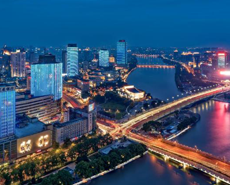
Operating rate in Yunnan will drop sharply and silicon metal prices still have room to increase
----Interview with Liangguang Huang, President of Silicon Metal Association of the Prefecture of Dehong, Yunnan
Silicon Metal Association of the Prefecture of Dehong, Yunnan was established on 26th March, 2010 in Mangshi, Yunnan, which aims to establish a platform of communication and exchange for its member enterprises, related government departments and industries, in order to defend the legal rights of its members and eventually make contribution to the advancement of the silicon metal industry and the economic development of the county.
Aim of the association: to provide service, to strengthen communication, to ensure high-efficiency and to consolidate cooperation.
Aim of the association: to provide service, to strengthen communication, to ensure high-efficiency and to consolidate cooperation.
Asian Metal: Mr. Huang, thank you for accepting the interview of Asian Metal. Could you please give us a brief introduction Silicon Metal Association of the Prefecture of Dehong?
Huang: The silicon metal industry in Dehong has developed gradually with the production capacity increasing by 30% by years since 2008. Silicon Metal Association of the Prefecture of Dehong was established in October 2009. In the aim of developing the industry and reaching achievement together, the association persevered in our efforts to serve the members. Until November 2016, there were in total 33 smelters with 70 furnaces in Dehong. (18 smelters with 31 furnaces in Yingjiang, 4 smelters with 8 furnaces in Longchuan, 2 smelters with 6 furnaces in Lianghe, 3 smelters with 11 furnaces in Ruili and 6 smelters with 14 furnaces in Mangshi.)
Asian Metal: How is the silicon metal production capacity distribution in China?
Huang: In 2015, Xinjiang has exceeded Yunnan to be the number one in silicon metal output in China, accounting for 24.6% of the total output in the year (The production capacity in Xinjiang is still expanding.) The output of Yunnan and Sichuan accounted for 24.1% and 19.5% of the total output in China in 2015. The aggregate output of the above three provinces reached 1,300,000t in 2015, accounting for 68.2% of the total output in China.
Chinese silicon metal production capacity and output by regions in 2013 to 2015 (Unit:0000t)
| Area | 2013 | 2014 | 2015 | |||
| Capacity | Output | Capacity | Output | Capacity | Output | |
| Yunnan | 110 | 40 | 110 | 45 | 120 | 47 |
| Xinjiang | 60 | 25 | 65 | 31 | 105 | 48 |
| Sichuan | 48 | 20 | 50 | 24 | 70 | 38 |
| Guizhou | 32 | 12 | 25 | 13 | 15 | 8 |
| Hunan | 25 | 7 | 25 | 10 | 15 | 8 |
| Gansu | 20 | 10 | 20 | 10 | 20 | 8 |
| Fujian | 26 | 9 | 25 | 12 | 25 | 13 |
| Others | 59 | 22 | 65 | 25 | 80 | 25 |
| Total | 380 | 145 | 385 | 170 | 450 | 195 |















